Leadership Consortium
The National Academy of Medicine’s Leadership Consortium: Collaboration for a Learning Health System provides a trusted venue for national leaders in health and health care to work cooperatively toward their common commitment to effective, innovative care that consistently adds value to patients and society.
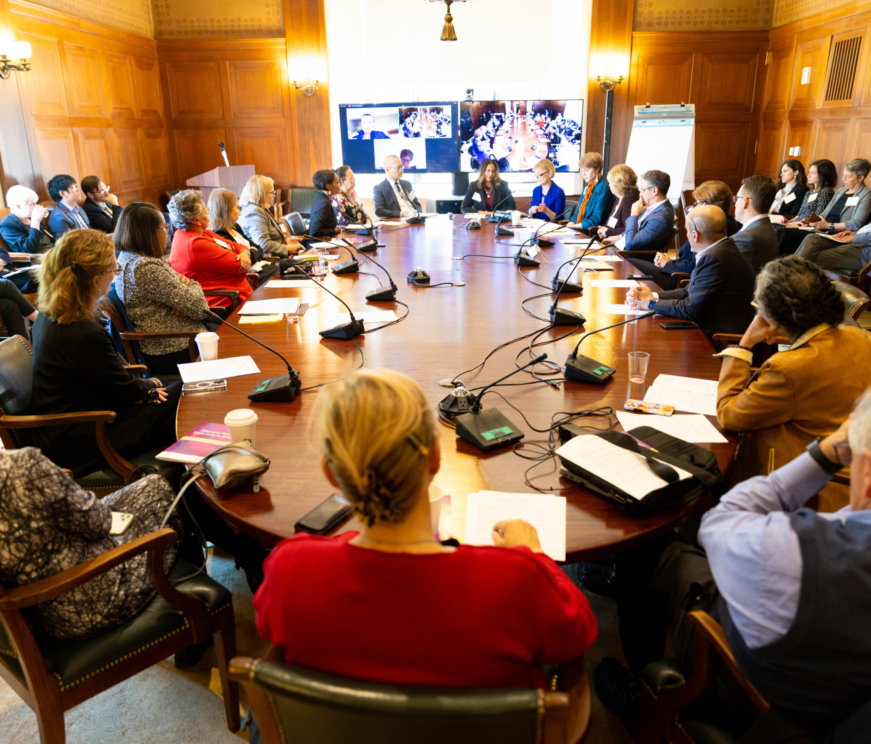
NAM Leadership Consortium Charter
A learning health system is one in which science, informatics, incentives, and culture are aligned for continuous improvement, innovation, and equity—with best practices and discovery seamlessly embedded in the delivery process, individuals and families active participants in all elements, and new knowledge generated as an integral by-product of the delivery experience.
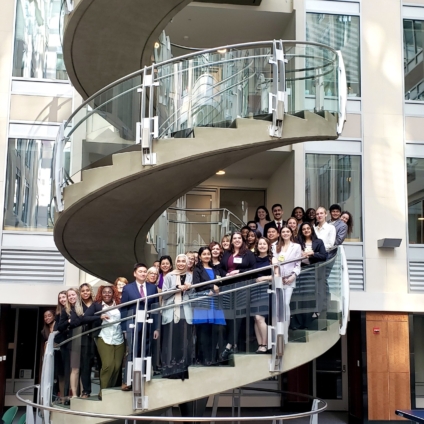
Consortium Members
Consortium Members are leaders from core stakeholder communities brought together by their common commitment to steward the advances in science, value, and culture necessary for a health system that continuously learns and improves in fostering healthier people. The goal of Consortium Members is to align stakeholder organizations and agencies around common strategies and commitments to reverse health system fragmentation, misplaced incentives, and systemic barriers, and to achieve the full potential for health and health care performance that is effective, efficient, equitable, and continuously learning at every level.
A Trust Framework for the Common Good
Learning Health System & Our Shared Commitments
Transformative focus and re-alignment are required to correct the systemic shortfalls in the nation’s health and health care outcomes—many painfully underscored during the COVID-19 pandemic. The NAM’s efforts have therefore expanded and updated the focus to include both health and health care, and added the important elements of individual engagement, transparency, accountability, security, and continuous learning. Learn more about Learning Health Systems and the 10 Shared Commitments that serve as proven reference points for the commitment of all learning health organizations to effectiveness, efficiency, equity, and continuous learning.

Action Collaboratives
Advancing health and health care through cooperative projects
Action Collaboratives engage key stakeholders with similar interests and field responsibilities in cooperative activities to advance science and value in health and health care. These ad hoc convening activities aim to foster sector information sharing and cooperation in accelerating the evolution of a continuously learning health system, and progress on findings highlighted in prior Academies reports of mutual priority. Action Collaboratives currently support activities in four overlapping and complementary areas:
Consortium Approach
Employing an inclusive, collaborative approach
These convening activities bring together stakeholders with mutual interests to harness their expertise in identifying and developing strategic, field-advancing projects. Projects of the Action Collaboratives are participant identified, driven, and supported, with facilitation by Consortium staff. These projects vary in structure and content to address specific issues, with some focusing on marshaling needed leadership, expertise, and resources, developing tools, or highlighting strategies through literature summaries, technical discussions, and cooperative reviews. Some activities lead to proposals for workshops or studies for consideration by the NAM and the Academies.

Commission on Investment Imperatives for a Healthy Nation
To address the growing threat to the nation’s health status, productivity, and competitiveness—the acute shortfall in health system effectiveness, efficiency, and equity—the Leadership Consortium announced the formation of the Emerging Fairer & Stronger from COVID-19: the National Commission on Investment Imperatives for a Healthy Nation (the Commission). The Commission aims to advance transformative improvements in the U.S. health system, motivated by and based on lessons learned from deadly shortfalls experienced during the COVID-19 pandemic. Learn more about this new initiative.

Health Care Artificial Intelligence Code of Conduct
The NAM Leadership Consortium’s new initiative aims to align & facilitate adoption of an AI Code of Conduct for health, medical care, and health research. Learn more about this multi-phased project to ensure responsible & equitable use of AI in health care.
Assessing Meaningful Community Engagement
Guided by a committee of national and community leaders that reflect diverse backgrounds and perspectives, the Assessing Community Engagement project aims to provide community-engaged, effective, and evidence-based tools to those who want to measure engagement to ensure that it is meaningful and impactful, with a special emphasis on ensuring equity as a critical input and outcome.

Recent Publications
An Artificial Intelligence Code of Conduct for Health and Medicine: Essential Guidance for Aligned Action

Over the last decade, advances in artificial intelligence (AI) technologies have created transformational opportunities for health, health care, and biomedical science. While new tools are available to improve effectiveness and efficiency in myriad applications in health and health care, challenges persist, including those related to increasing costs of care, staff burnout and shortages, and the growing disease burden of an aging population. The need for new approaches to address these long-standing challenges is evident and AI offers both new hope and new concerns.
An Artificial Intelligence Code of Conduct for Health and Medicine: Essential Guidance for Aligned Action presents a unifying AI Code of Conduct (AICC) framework developed to align the field around responsible development and application of AI and to catalyze collective action to ensure that the transformative potential of AI in health and medicine is realized. Designed to be applied at every level of decision making—from boardroom to bedside and from innovation labs to reimbursement policies—the publication serves as a blueprint for building trust, protecting patients, and ensuring that innovation benefits people.
Generative Artificial Intelligence in Health and Medicine: Opportunities and Responsibilities for Transformative Innovation

The integration of large language models (LLMs) and generative artificial intelligence (AI) in health care holds the potential to transform the practice of medicine, the work and experiences of health care providers, and the health and well-being of patients. Generative AI can support clinical decision making and streamline workflows, promote patients and their support networks’ engagement in care processes, and support clinical research.
However, successful and ethical implementation of generative AI requires careful consideration of the associated risks, particularly those concerning data privacy, bias, transparency, and infrastructure limitations.
Generative Artificial Intelligence in Health and Medicine: Opportunities and Responsibilities for Transformative Innovation explores the transformative potential of generative AI in health care, with a focus on its applications in clinical decision making, administrative efficiency, and patient engagement.
Shared Commitments for Health and Health Care: A Trust Framework from the Learning Health System
Shared Commitments for Health and Health Care: A Trust Framework from the Learning Health System, a new NAM Perspectives Commentary, offers a paradigm for rethinking and renewing bedrock commitments for health stakeholders and strengthening the trust fabric underpinning health care. The paper outlines 10 Shared Commitments that serve as a trust framework to unify expectations among organizational leaders and clients alike—one that can guide health sector reference points and help foster progress against the challenges of system fragmentation and misplaced incentives that result in mistrust.
Valuing America’s Health: Aligning Financing to Award Better Health and Well-Being
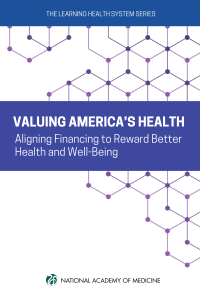 The United States is experiencing a decline in life expectancy despite high health care spending due to a multitude of factors, including the COVID-19 pandemic, opioid epidemic, high burden of chronic disease, and systemic and structural inequities.
The United States is experiencing a decline in life expectancy despite high health care spending due to a multitude of factors, including the COVID-19 pandemic, opioid epidemic, high burden of chronic disease, and systemic and structural inequities.
A response proportional to this crisis is required. Valuing America’s Health: Aligning Financing to Reward Better Health and Well-Being explores opportunities to transform the current health and health care system to one that promotes whole person and whole population health. The publication emphasizes the need for a bold vision and sustainable financing strategies to prioritize health and well-being for all. Authors of the publication highlight the importance of building a movement to prioritize health, repairing systemic failures, holding stakeholders accountable, controlling health care costs, incentivizing health promotion, adopting collaborative financing and policy-making approaches, and empowering individuals and communities in health decision-making.
The way is clear; what is needed now is the will to move forward. Learn more about how to ensure our nation’s health and health care system can support optimal health for all.
Emerging Stronger After COVID-19: Priorities for Health System Transformation
 For decades, the U.S. health system has fallen far short of its potential to support and improve individual and population health. The COVID-19 pandemic has presented death and devastation—but also an unprecedented opportunity to truly transform U.S. health, health care, and health delivery.
For decades, the U.S. health system has fallen far short of its potential to support and improve individual and population health. The COVID-19 pandemic has presented death and devastation—but also an unprecedented opportunity to truly transform U.S. health, health care, and health delivery.
To capitalize on this opportunity, the National Academy of Medicine gathered field leaders from across all of the major health system sectors to assess how each sector has responded to the pandemic and the opportunities that exist for health system transformation. The opportunity is now to capitalize on the hard-won lessons of COVID-19 and build a health care system that centers patients, families, and communities; cares for clinicians; supports care systems, public health, and biomedical research to perform at the best of their abilities; applies innovations from digital health and quality, safety, and standards organizations; and encourages health care payers and health product manufacturers and innovators to produce products that benefit all.
Catalyzing Innovative Health System Transformation: An Opportunity Agenda for the Center for Medicare & Medicaid Innovation
 Since its founding, the Center for Medicare & Medicaid Innovation (CMMI) has tested more than 50 alternative payment models reaching more than 28 million patients across 528,000 health care providers and plans, yielding invaluable insights on the implementation of models to achieve better care, better health, and lower costs. On the other hand, many basic lessons learned are lessons unapplied. U.S. population health outcomes lag behind its highly economically developed peers and our health system is still firmly entrenched in the fee-for-service payment system that rewards service volume.
Since its founding, the Center for Medicare & Medicaid Innovation (CMMI) has tested more than 50 alternative payment models reaching more than 28 million patients across 528,000 health care providers and plans, yielding invaluable insights on the implementation of models to achieve better care, better health, and lower costs. On the other hand, many basic lessons learned are lessons unapplied. U.S. population health outcomes lag behind its highly economically developed peers and our health system is still firmly entrenched in the fee-for-service payment system that rewards service volume.
This Special Publication suggests six key priority actions for CMMI centered on signaling, mapping, measuring, modeling, partnering, and demonstrating. These priority actions, coupled with implementation considerations that focus on meaningful and continuous engagement, intersectionality and diversity, and expanding CMMI activities and impact, are intended to assist in aligning, supporting, and informing the implementation of CMMI’s Strategic Refresh.
Priorities on the Health Horizon: Informing PCORI’s Strategic Plan
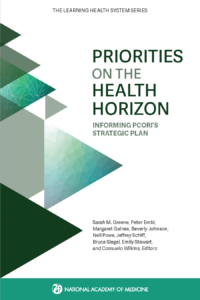 To inform the next steps in their organizational strategy, the Patient-Centered Outcomes Research Institute (PCORI) enlisted the NAM to leverage its deep experience in convening experts on matters of significant national importance, including its longstanding thought leadership role in the realization of a learning health system.
To inform the next steps in their organizational strategy, the Patient-Centered Outcomes Research Institute (PCORI) enlisted the NAM to leverage its deep experience in convening experts on matters of significant national importance, including its longstanding thought leadership role in the realization of a learning health system.
This Special Publication outlines high-priority emerging issues in health, health care, and biomedical science and technology and offers cross-cutting opportunities to inform and shape PCORI’s strategic planning process to improve the effectiveness, efficiency, and equity of the U.S. health care system. Moving forward, building the capacity to continuously improve learning and sharing throughout the system will entail stakeholders working together as seamlessly as possible. The NAM and PCORI worked together to facilitate an expansive dialogue with key stakeholders ad engender trust through a focus on shared commitments to progress on improving health for all Americans in the decade ahead.
Sharing Health Data: The Why, the Will, and the Way Forward
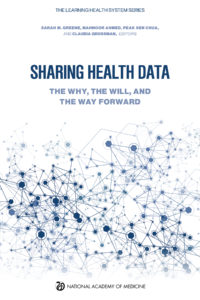 Sharing health data and information across stakeholder groups is the bedrock of a learning health system. As data and information are increasingly combined across various sources, their generative value to transform health, health care, and health equity increases significantly. Health data has proven its centrality in guiding action to change the course of individual and population health, if properly stewarded and used.
Sharing health data and information across stakeholder groups is the bedrock of a learning health system. As data and information are increasingly combined across various sources, their generative value to transform health, health care, and health equity increases significantly. Health data has proven its centrality in guiding action to change the course of individual and population health, if properly stewarded and used.
This Special Publication features some of these novel data sharing collaborations, and has been developed to provide practical context and implementation guidance that is critical to advancing the lessons learned identified in its parent NAM Special Publication, Health Data Sharing: Building a Foundation of Stakeholder Trust. The focus of this publication is to identify and describe exemplar groups to dispel the myth that sharing health data more broadly is impossible and illuminate the innovative approaches that are being taken to make progress in the current environment.
Health Data Sharing to Support Better Outcomes: Building a Foundation of Stakeholder Trust
 The effective use of data is foundational to the concept of a learning health system—one that leverages and shares data to learn from every patient experience, and feeds the results back to clinicians, patients and families, and health care executives to transform health, health care, and health equity. More than ever, the American health care system is in a position to harness new technologies and new data sources to improve individual and population health.
The effective use of data is foundational to the concept of a learning health system—one that leverages and shares data to learn from every patient experience, and feeds the results back to clinicians, patients and families, and health care executives to transform health, health care, and health equity. More than ever, the American health care system is in a position to harness new technologies and new data sources to improve individual and population health.
We can improve together by sharing and using data in ways that produce trust and respect. Patients and families deserve nothing less.
Artificial Intelligence in Health Care: The Hope, the Hype, the Promise, the Peril
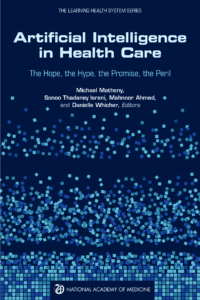 The emergence of artificial intelligence (AI) in health care offers unprecedented opportunities to improve patient and clinical team outcomes, reduce costs, and impact population health. While there have been a number of promising examples of AI applications in health care, it is imperative to proceed with caution or risk the potential of user disillusionment, another AI winter, or futher exacerbation of existing health- and technology-driven disparities.
The emergence of artificial intelligence (AI) in health care offers unprecedented opportunities to improve patient and clinical team outcomes, reduce costs, and impact population health. While there have been a number of promising examples of AI applications in health care, it is imperative to proceed with caution or risk the potential of user disillusionment, another AI winter, or futher exacerbation of existing health- and technology-driven disparities.
This Special Publication synthesizes current knowledge to offer a reference document for relevant health care stakeholders. It outlines the current and near-term AI solutions; highlights the challenges, limitations, and best practices for AI development, adoption, and maintenance; offers an overview of the legal and regulatory landscape for AI tools designed for health care application; prioritizes the need for equity, inclusion, and a human rights lens for this work; and outlines key considerations for moving forward.
AI is poised to make transformative and disruptive advances in health care, but it is prudent to balance the need for thoughtful, inclusive health care AI that plans for and actively manages and reduces potential unintended consequences, while not yielding to marketing hype and profit motives.
Caring for the Individual Patient: Understanding Heterogeneous Treatment Effects
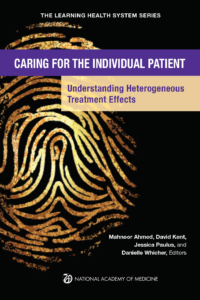 Evidence-based medicine arose from a clear need and represents a major advance in the science of clinical decision-making. Despite broad acceptance of evidence-based medicine, however, a fundamental issue remains unresolved: evidence is derived from groups of people, yet medical decisions are made by and for individuals. Despite persistent assertions from clinicians that determining the best therapy for each patient is a more complicated endeavor than just picking the best treatment on average, traditional approaches have been overly reliant on the average effects estimated from the outcomes of clinical trials.
Evidence-based medicine arose from a clear need and represents a major advance in the science of clinical decision-making. Despite broad acceptance of evidence-based medicine, however, a fundamental issue remains unresolved: evidence is derived from groups of people, yet medical decisions are made by and for individuals. Despite persistent assertions from clinicians that determining the best therapy for each patient is a more complicated endeavor than just picking the best treatment on average, traditional approaches have been overly reliant on the average effects estimated from the outcomes of clinical trials.
For evidence to be more applicable to individual patients, we need to combine methods for strong causal inference (first and foremost, randomization) with methods for prediction that permit inferences about which particular patients are likely to benefit and which are not. Better population-based outcomes will only be realized when we understand more completely how to treat patients as the unique individuals they are.
Program News

Leadership Consortium Staff

Michael McGinnis, a physician and epidemiologist, is an elected member of the National Academy of Medicine (1999), now serving as NAM Senior Scholar, Leonard D. Schaeffer Executive Officer of the NAM and Executive Director of the NAM Leadership Consortium. He is the architect of the NAM’s Learning Health System Initiative catalyzing collaborative national progress in the alignment of science, informatics, incentives, and culture for continuous improvement in health and health care. Our Shared Commitments represents the promise and expectations of this work. To provide platforms for societal uptake of this and other NAM contributions, Dr. McGinnis also established Action Collaboratives for cooperative projects of multiple stakeholders, and the periodic publication vehicle, NAM Perspectives.
A longstanding field leader, Dr. McGinnis has helped shape the field of population health in various ways. The Fries Prize for Improving Health cited him for “fundamentally transforming our nation’s understanding about how to improve health by re-conceptualizing the nation’s perspective on its leading health threats and establishing the Healthy People process of national goals and objectives to target action.” His article with William Foege, Actual Causes of Death (JAMA, 1993) integrated epidemiologic studies to demonstrate, qualitatively and quantitatively, that most of the leading killers of Americans—e.g. heart disease, cancer, stroke, diabetes—had preventable root sources, many of which were behavioral, environmental, and social in nature. Building on this work, he and colleagues later showed, again quantitatively and qualitatively, that the health of individuals and populations is the result of the interplay of dynamics in five domains: genetic predispositions, behavioral choices, social circumstances, physical environments, and medical care (The Case for More Active Policy Attention to Health Promotion, Health Affairs 2002).
Dr. McGinnis’ has accelerated the impact of health and medical science through the development of practical tools and strategies for front line application of the evidence. As Assistant Surgeon General and Deputy Assistant Secretary for Health at the Department of Health & Human Services in four Presidential Administrations (1977 to 1995, a tenure unusual for political and policy posts), he held leadership responsibilities for federal activities in disease prevention and health promotion. In this period, he conceived and launched several still ongoing national programs: the Healthy People national goals and objectives (above), the Dietary Guidelines for Americans (with USDA), and the U.S. Preventive Services Task Force. Later, as Senior Vice President and head of the Health Group at the Robert Wood Johnson Foundation (1999-2005), Dr. McGinnis led development of the platform for the Foundation’s shift to sustained leadership and funding in population health science and the social determinants of health.
With a global health interest from the outset of his career, Dr. McGinnis coordinated U.S.-Eastern European health exchange programs and later served as state director in India for the WHO smallpox eradication program (1974-5), developing the surveillance system for the country-wide post-eradication operations. In post-war Bosnia as Chair of the World Bank/European Commission Task Force on Health & Human Services (1995-6), he led development of the signed agreement on priorities and strategies for rebuilding the health and human services capacity—the first such agreement outside the Dayton Accords.
Dr. McGinnis’ publications include more than 200 articles and book chapters, and 20 edited books. Various national recognitions include the public health Distinguished Service Award (1994), Health Leader of the Year Award (1997), Public Health Hero Award (2013), and the Fries Prize for Health Improvement (2018). His degrees are from Berkeley (1966), UCLA (1971), and Harvard (1977).








Asia Williams is an Associate Program Officer at the National Academy of Medicine (NAM) Leadership Consortium Collaboration for a Learning Health System. In this role she leads the Culture Inclusion & Equity Action Collaborative. Before this role, Asia attended Drexel University, where she studied health management and policy and received her MPH. At Drexel, she also conducted quality improvement research for intensive care units at Thomas Jefferson University Hospitals and federally qualified health centers for the Philadelphia Department of Public Health. Asia also received her BS in Human Services at Northeastern University. She has strong interests in social determinants of health research and promoting meaningful patient, family, and community engagement in developing and implementing equitable and sustainable health and health care programs and policies.

Have Questions?
Get in Touch
For more information about the Leadership Consortium, please contact us.
